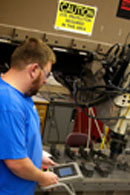Mechanical Engineering MS

Mission
The mission of the Mechanical Engineering graduate program
is to provide students with advanced learning in the areas of thermo-fluid
sciences, mechanical systems, or manufacturing/controls. The primary goals of
the program are to develop the scholastic ability, independent creativity, and
professional competence of the student to a higher level than is possible in an
undergraduate program.
Objectives
Through the education offered by the MS/ME program, students
will learn:
- to formulate solutions
to mechanical engineering problems using multi-disciplinary approaches
- to be able to grow
professionally and personally
- to serve their
profession and community as valuable contributing leaders
Outcomes
Students undertaking education in MS/ME program are expected
to
- expand their knowledge
and understanding of methods and approaches to advancing knowledge in the
basic areas of Mechanical Engineering
- formulate solutions to
problems related to thermo-fluid sciences,
mechanical systems, or manufacturing/controls
- be able to conduct basic
or applied research and development in Mechanical Engineering
- become an engineer who
will serve their profession and community as valuable contributing leaders
Research Equipment and Facilities
The ME Graduate Studies and Research Program focuses on three primary areas of scientific research in mechanical engineering and engineering mechanics: fluid dynamics & thermal science, solid mechanics & material science, and robotics & controls. The research activities of the ME faculty involve both computational and experimental efforts across several departmental laboratories, including the Center for Advanced Multidisciplinary Projects (CAMP); Energy Storage Lab (ESL); Experimental and Computational Mechanics Laboratory (ECML); Fluids, Thermodynamics, and Heat Transfer lab; Holistic Engineering Learning Lab and Observatory (HELLO); Joining and Mechanics of Polymers (JMP) lab; Laboratory of Interfacial Transport (LIT); Laser Plasma Diagnostics Lab (LPDL); Powerful high-performance computing cluster; and Robotics and Computational Kinematics Innovation (ROCKIN) lab.
Strong research collaborations exist among these laboratories as well as campus-wide research centers, such as:
- Additive Manufacturing Laboratory (AML)
- Arbegast Materials Processing and Joining (AMP) lab
- Center for Security Printing and Anti-Counterfeiting Technology (SPACT)
- Composites and Polymer Engineering (CAPE) lab
- Surface Engineering Research Center (SERC)
Curriculum
The mechanical engineering curriculum is designed to give students a thorough knowledge of the basic principles involved in the major stems of mechanical engineering: thermoscience, mechanical systems, and manufacturing.
The Master of Science degree program in mechanical engineering can be pursued using either of two (2) equal options, a thesis option or a non-thesis option. Each option requires 30 credits.
Click here for more details about the curriculum.
Accelerated Master's Program
Current South Dakota Mines students pursuing a bachelor of science degree have the option to enroll in our accelerated master's program.